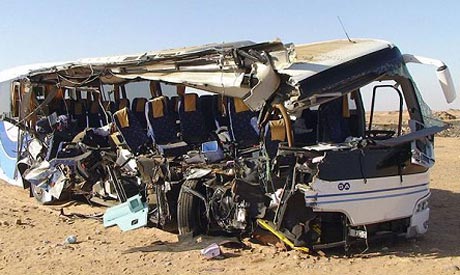New figures for transport fatalities show security crackdowns and street clashes are not the only dangers for Egyptians.
Road and rail accidents claimed over 7,000 lives in Egypt in 2010, a 7.9 per cent rise on the previous year, the Central Authority for Public Mobilization and Statistics (CAPMAS) said on Thursday.
7,040 people were killed in road and rail accidents in Egypt in 2010, a disturbing climb on the 6,486 fatalities recorded for 2009.
2010 saw 66.8 road accidents per day, up from 62.4 in 2009. The annual total was 24,371, against 22,793 the previous year.
An average of 19.3 people were killed on the roads in 2010, up from 17.8 in 2009. Injuries also rose to 98.7 per day in 2010, up from 97.1 the previous year.
Egypt's youth bore the brunt of casualties, with 48.4 per cent of those killed in automobile accidents between the ages of 15 and 30, according to CAPMAS.
Human error was blamed for the majority -- 60 per cent -- of road accidents, although the proportion pointing to this factor fell 8 per cent compared to 2009 figures.
Speeding was named as a factor in 19 per cent of incidents, while poorly maintained roads, chaotic traffic and lax law enforcement were significant causes too.
Trucks were involved in 40 per cent of vehicle accidents in 2010, making them the primary cause of car accidents on highways.
The most dangerous stretch of road was the Qatameya-Ain El-Sokhna highway, which saw 4.0 deaths or injuries per accident in 2010.
Train accidents, conversely, dropped by a third, from 1,577 in 2009 to 1,057 in 2010. The rate of accidents fell accordingly from 5.9 to 4.3 per million passengers.
The number of fatalities and casualties also plunged by 53.1 and 68.4 per cent respectively.
Aside from the social and political repurcussions of traffic accidents, analysts have in the past suggested there is a possible economic impact.
In a 2008 report the dissolved National Democratic Party estimated economic losses of road and rail accidents ar around LE2 billion for the previous year. The loss was said to be worth 1.5 per cent of Egypt's total GDP.

These figures shed light on a transportation system - in a country that is the largest automotive market in the Middle East and North Africa - so fraught with dangers that even tourists who come for a brief visit are at risk.
But it is the thousands of Egyptians who lose their lives every year that in the end that pay the ultimate sacrifice.
A World Health Organization (WHO) survey found that every year more than 7,000 people are killed in traffic accidents in Egypt. The Central Agency for Public Mobilization and Statistics (CAPMAS) says that car road accidents amounted to 22,793 in 2009, an 8.9% increase compared to the previous year.
The dangers faced on Egypt's transportation network hit home in October when the American University in Cairo (AUC) mourned the death of a 20-year-old student whose car overturned as he tried to avoid a depression on Road 90, which leads to campus.
On the same day the AUC community held a memorial in his honor, another student survived being hit by a truck on the same road.
Three weeks earlier, AUC's vice-president for student affairs narrowly avoided a fatal crash with a truck with faulty breaks. The increasing number of accidents on Road 90, which is a main artery leading to several universities and construction sites in New Cairo, has led some to nickname it the "road of death".
Anyone who has been to Cairo knows that navigating through poorly maintained roads and overcrowded streets is a hazardous endeavor.
A report researched by students in an investigative journalism course I teach discovered that there is a dangerous driving culture in Egypt that is caused by faulty vehicle and traffic maintenance, public failure to abide by safety codes, and lax official enforcement of existing traffic laws.
The students interviewed sources at the Ministry of Interior, the Ministry of Transportation, road safety experts and senior auto mechanics. They discovered that:
- Nearly 73% of road accidents are caused by human error such as speeding, drug use, distracted driving (use of cell phones) and failure to stop for pedestrians;
- At least 30% of truck and trailer drivers tested positive for drug use, in a study conducted by both ministries;
- A growing number of accidents are caused by trucks and trailers hauling materiel to and from Cairo;
- Some 70% of fatalities occur to people who are not even in
the vehicle, because of an insufficient number of crosswalks and
pedestrian overpasses;
- Less than 1% of all cars stop to allow pedestrians to cross the street;
- Bursting tires, along with failing brakes and malfunctioning steering wheels, are the leading causes of accidents;
- Cars manufactured in the former East Europe are the most dangerous on Egypt's roads and fail international safety codes;
- A number of traffic by-laws passed in 2008 have been enforced "theoretically, not practically" according to one official.
In the last two months, Egyptian police have set up radar monitoring of highways and several roadblocks to check on expired licenses. Police have also vowed to aggressively pursue underage drivers.
This article is based on research conducted by the following students in my investigative journalism class: Nadeen Shaker, Heba AbdelRahman, Lacie Simpson, Habiba El Husseiny, Rana Kamaly, Ahmed El Dahan, Reem Khedr, Dina Khadr, Tarek El Deeb and Sherif Afifi.
